Deck 11: Stabilizing the Economy: The Role of the Fed
Question
Question
Question
Question
Question
Question
Question
Question
Question
Question
Question
Question
Question
Question
Question
Question
Question
Question
Question
Question
Question
Question
Question
Question
Question
Question
Question
Question
Question
Question
Question
Question
Question
Question
Question
Question
Question
Question
Question
Question
Question
Question
Question
Question
Question
Question
Question
Question
Question
Question
Question
Question
Question
Question
Question
Question
Question
Question
Question
Question
Question
Question
Question
Question
Question
Question
Question
Question
Question
Question
Question
Question
Question
Question
Question
Question
Question
Question
Question
Question

Unlock Deck
Sign up to unlock the cards in this deck!
Unlock Deck
Unlock Deck
1/163
Play
Full screen (f)
Deck 11: Stabilizing the Economy: The Role of the Fed
1
Joan has the following assets and liabilities: 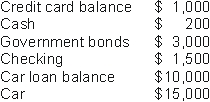 Which of the following actions would increase Joan's money demand by $100?
Which of the following actions would increase Joan's money demand by $100?
A) Joan writes a check for $100 to pay down her credit card balance.
B) Joan writes a check for $100 to pay down her car loan balance.
C) Joan pays $100 cash for a new lamp.
D) Joan sells a $100 government bond and puts the proceeds in her checking account.
 Which of the following actions would increase Joan's money demand by $100?
Which of the following actions would increase Joan's money demand by $100?A) Joan writes a check for $100 to pay down her credit card balance.
B) Joan writes a check for $100 to pay down her car loan balance.
C) Joan pays $100 cash for a new lamp.
D) Joan sells a $100 government bond and puts the proceeds in her checking account.
Joan sells a $100 government bond and puts the proceeds in her checking account.
2
The demand for money is:
A) unlimited, since people want to hold as much money as possible.
B) limited by the amount of currency printed by the government.
C) the amount of wealth an individual chooses to hold in the form of money.
D) the amount of income an individual chooses to hold in the form of money.
A) unlimited, since people want to hold as much money as possible.
B) limited by the amount of currency printed by the government.
C) the amount of wealth an individual chooses to hold in the form of money.
D) the amount of income an individual chooses to hold in the form of money.
the amount of wealth an individual chooses to hold in the form of money.
3
The decision about the forms in which to hold one's wealth is called the ______ decision.
A) Taylor
B) portfolio allocation
C) Fisher effect
D) life-cycle
A) Taylor
B) portfolio allocation
C) Fisher effect
D) life-cycle
portfolio allocation
4
Jan's Dry Cleaning holds $10,000 on a typical day, although only $2,000 is essential for carrying out business. Making a midday deposit is estimated to reduce cash holdings to $8,000 and cost an extra $80 per year in lost production. If, in addition, an armored car service is engaged to pick up cash more frequently for a fee of $120 per year, cash holdings will be further reduced to $6,000 per day. Employing a computerized cash management service for an annual fee of $180 would reduce cash holdings further to $4,000. If any reduction in cash holdings will be invested in government bonds earning 3%, then how much money should Jan's hold?
A) $10,000
B) $8,000
C) $6,000
D) $4,000
A) $10,000
B) $8,000
C) $6,000
D) $4,000

Unlock Deck
Unlock for access to all 163 flashcards in this deck.
Unlock Deck
k this deck
5
Monetary policy is _____ flexible than fiscal policy because monetary policy changes are made by ______, while fiscal policy changes must be made by ________.
A) more; the FOMC; legislative action
B) less; the FOMC; the President
C) more; legislative action; the FOMC
D) more; the President; legislative action
A) more; the FOMC; legislative action
B) less; the FOMC; the President
C) more; legislative action; the FOMC
D) more; the President; legislative action

Unlock Deck
Unlock for access to all 163 flashcards in this deck.
Unlock Deck
k this deck
6
Any value of the money supply chosen by the Federal Reserve implies a specific value for ______.
A) potential output
B) the nominal interest rate
C) government purchases
D) the budget deficit
A) potential output
B) the nominal interest rate
C) government purchases
D) the budget deficit

Unlock Deck
Unlock for access to all 163 flashcards in this deck.
Unlock Deck
k this deck
7
_____ policy changes are made through the legislative process, while _____ policy changes are made by the Federal Open Market Committee.
A) fiscal; international
B) monetary; fiscal
C) fiscal; monetary
D) monetary; international
A) fiscal; international
B) monetary; fiscal
C) fiscal; monetary
D) monetary; international

Unlock Deck
Unlock for access to all 163 flashcards in this deck.
Unlock Deck
k this deck
8
Innovations in the United States, such as credit cards, debit cards, ATM:s, and online-banking have:
A) increased the demand for money.
B) decreased the demand for money.
C) had no impact on the supply or demand for money.
D) increased the supply of money.
A) increased the demand for money.
B) decreased the demand for money.
C) had no impact on the supply or demand for money.
D) increased the supply of money.

Unlock Deck
Unlock for access to all 163 flashcards in this deck.
Unlock Deck
k this deck
9
Jan's Dry Cleaning holds $10,000 on a typical day, although only $2,000 is essential for carrying out business. Making a midday deposit is estimated to reduce cash holdings to $8,000 and cost an extra $80 per year in lost production. If, in addition, an armored car service is engaged to pick up cash more frequently for a fee of $120 per year, cash holdings will be further reduced to $6,000 per day. Employing a computerized cash management service for an annual fee of $180 would reduce cash holdings further to $4,000. If any reduction in cash holdings will be used to purchase government bonds earning 5%, then how much money should Jan's hold?
A) $10,000
B) $8,000
C) $6,000
D) $4,000
A) $10,000
B) $8,000
C) $6,000
D) $4,000

Unlock Deck
Unlock for access to all 163 flashcards in this deck.
Unlock Deck
k this deck
10
The usefulness of money in carry out transactions is its _____ and the nominal interest rate is its ____.
A) supply; demand
B) demand; supply
C) cost; benefit
D) benefit; cost
A) supply; demand
B) demand; supply
C) cost; benefit
D) benefit; cost

Unlock Deck
Unlock for access to all 163 flashcards in this deck.
Unlock Deck
k this deck
11
The opportunity cost of money is:
A) the time spent going to the bank to withdraw funds.
B) the fees charged by banks to provide checking services.
C) the nominal interest rate.
D) the price level.
A) the time spent going to the bank to withdraw funds.
B) the fees charged by banks to provide checking services.
C) the nominal interest rate.
D) the price level.

Unlock Deck
Unlock for access to all 163 flashcards in this deck.
Unlock Deck
k this deck
12
Because _____ policy is more flexible than ______ policy, it is used more actively to help stabilize the economy.
A) fiscal; monetary
B) structural; fiscal
C) monetary; fiscal
D) structural; monetary
A) fiscal; monetary
B) structural; fiscal
C) monetary; fiscal
D) structural; monetary

Unlock Deck
Unlock for access to all 163 flashcards in this deck.
Unlock Deck
k this deck
13
The benefit of holding money is _______, while the opportunity cost of holding money is _______.
A) the nominal interest rate; the fees charged by banks
B) the nominal interest rate; its usefulness in carrying out transactions
C) increased income; lost purchasing power
D) its usefulness in carrying out transactions; the nominal interest rate
A) the nominal interest rate; the fees charged by banks
B) the nominal interest rate; its usefulness in carrying out transactions
C) increased income; lost purchasing power
D) its usefulness in carrying out transactions; the nominal interest rate

Unlock Deck
Unlock for access to all 163 flashcards in this deck.
Unlock Deck
k this deck
14
Jim has the following assets and liabilities: 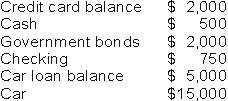 What is Jim's money demand?
What is Jim's money demand?
A) $500
B) $750
C) $1,250
D) $3,250
 What is Jim's money demand?
What is Jim's money demand?A) $500
B) $750
C) $1,250
D) $3,250

Unlock Deck
Unlock for access to all 163 flashcards in this deck.
Unlock Deck
k this deck
15
Joan has the following assets and liabilities: 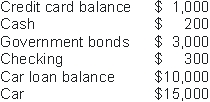 What is Joan's money demand?
What is Joan's money demand?
A) $200
B) $300
C) $500
D) $1,500
 What is Joan's money demand?
What is Joan's money demand?A) $200
B) $300
C) $500
D) $1,500

Unlock Deck
Unlock for access to all 163 flashcards in this deck.
Unlock Deck
k this deck
16
Jim has the following assets and liabilities: 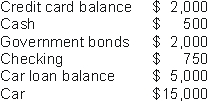 Which of the following actions would increase Jim's money demand by $200?
Which of the following actions would increase Jim's money demand by $200?
A) Jim writes a check for $200 to pay down his credit card balance.
B) Jim writes a check for $200 to pay down her car loan balance.
C) Jim pays $200 cash for a new lamp.
D) Jim gets a $200 cash advance on his credit card and puts the proceeds in his checking account.
 Which of the following actions would increase Jim's money demand by $200?
Which of the following actions would increase Jim's money demand by $200?A) Jim writes a check for $200 to pay down his credit card balance.
B) Jim writes a check for $200 to pay down her car loan balance.
C) Jim pays $200 cash for a new lamp.
D) Jim gets a $200 cash advance on his credit card and puts the proceeds in his checking account.

Unlock Deck
Unlock for access to all 163 flashcards in this deck.
Unlock Deck
k this deck
17
Joan has the following assets and liabilities: 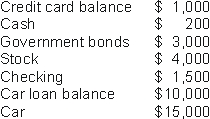 Which of the following actions would decrease Joan's money demand by $200?
Which of the following actions would decrease Joan's money demand by $200?
A) Joan writes a check for $200 to purchase additional shares of stock.
B) Joan gets a $200 cash advance on his credit card and puts the proceeds in her checking account.
C) Joan writes a $200 check for cash and holds the cash.
D) Joan sells $200 worth of stocks and puts the proceeds in her checking account.
 Which of the following actions would decrease Joan's money demand by $200?
Which of the following actions would decrease Joan's money demand by $200?A) Joan writes a check for $200 to purchase additional shares of stock.
B) Joan gets a $200 cash advance on his credit card and puts the proceeds in her checking account.
C) Joan writes a $200 check for cash and holds the cash.
D) Joan sells $200 worth of stocks and puts the proceeds in her checking account.

Unlock Deck
Unlock for access to all 163 flashcards in this deck.
Unlock Deck
k this deck
18
The decision about how much money to hold is an application of the:
A) scarcity principle.
B) principle of comparative advantage.
C) equilibrium principle.
D) cost-benefit principle.
A) scarcity principle.
B) principle of comparative advantage.
C) equilibrium principle.
D) cost-benefit principle.

Unlock Deck
Unlock for access to all 163 flashcards in this deck.
Unlock Deck
k this deck
19
Jim has the following assets and liabilities: 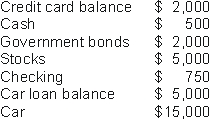 Which of the following actions would decrease Jim's money demand by $200?
Which of the following actions would decrease Jim's money demand by $200?
A) Jim writes a check for $200 to pay down his credit card balance.
B) Jim sells a $200 government bond and puts the proceeds in his checking account.
C) Jim writes a $200 check for cash and holds the cash.
D) Jim sells $200 worth of stocks and puts the proceeds in his checking account.
 Which of the following actions would decrease Jim's money demand by $200?
Which of the following actions would decrease Jim's money demand by $200?A) Jim writes a check for $200 to pay down his credit card balance.
B) Jim sells a $200 government bond and puts the proceeds in his checking account.
C) Jim writes a $200 check for cash and holds the cash.
D) Jim sells $200 worth of stocks and puts the proceeds in his checking account.

Unlock Deck
Unlock for access to all 163 flashcards in this deck.
Unlock Deck
k this deck
20
How much money to hold is an application of the:
A) scarcity principle.
B) principle of comparative advantage.
C) principle of increasing opportunity cost.
D) cost-benefit principle.
A) scarcity principle.
B) principle of comparative advantage.
C) principle of increasing opportunity cost.
D) cost-benefit principle.

Unlock Deck
Unlock for access to all 163 flashcards in this deck.
Unlock Deck
k this deck
21
Jan's Dry Cleaning holds $10,000 on a typical day, although only $2,000 is essential for carrying out business. Making a midday deposit is estimated to reduce cash holdings to $8,000 and cost an extra $80 per year in lost production. If, in addition, an armored car service is engaged to pick up cash more frequently for a fee of $120 per year, cash holdings will be further reduced to $6,000 per day. Employing a computerized cash management service for an annual fee of $180 would reduce cash holdings further to $4,000. If any reduction in cash holdings will be invested in government bonds earning 10%, then how much money should Jan's hold?
A) $10,000
B) $8,000
C) $6,000
D) $4,000
A) $10,000
B) $8,000
C) $6,000
D) $4,000

Unlock Deck
Unlock for access to all 163 flashcards in this deck.
Unlock Deck
k this deck
22
Higher nominal interest rates ______ the amount of money demanded and a higher price level ______ the amount of money demanded.
A) increase; increases
B) increase; decreases
C) decrease; increases
D) decrease; decreases
A) increase; increases
B) increase; decreases
C) decrease; increases
D) decrease; decreases

Unlock Deck
Unlock for access to all 163 flashcards in this deck.
Unlock Deck
k this deck
23
The following table shows Alex's estimated annual benefits of holding different amounts of money. 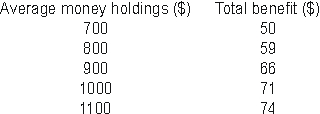 How much money will Alex hold if the nominal interest rate is 8 percent? (Assume she wants her money holdings to be in multiples of $100.)
How much money will Alex hold if the nominal interest rate is 8 percent? (Assume she wants her money holdings to be in multiples of $100.)
A) $700
B) $800
C) $900
D) $1,000
 How much money will Alex hold if the nominal interest rate is 8 percent? (Assume she wants her money holdings to be in multiples of $100.)
How much money will Alex hold if the nominal interest rate is 8 percent? (Assume she wants her money holdings to be in multiples of $100.)A) $700
B) $800
C) $900
D) $1,000

Unlock Deck
Unlock for access to all 163 flashcards in this deck.
Unlock Deck
k this deck
24
The following table shows Jay's estimated annual benefits of holding different amounts of money.  How much money will Jay hold if the nominal interest rate is 4 percent? (Assume he wants his money holdings to be in multiples of $100.)
How much money will Jay hold if the nominal interest rate is 4 percent? (Assume he wants his money holdings to be in multiples of $100.)
A) $100
B) $200
C) $300
D) $400
 How much money will Jay hold if the nominal interest rate is 4 percent? (Assume he wants his money holdings to be in multiples of $100.)
How much money will Jay hold if the nominal interest rate is 4 percent? (Assume he wants his money holdings to be in multiples of $100.)A) $100
B) $200
C) $300
D) $400

Unlock Deck
Unlock for access to all 163 flashcards in this deck.
Unlock Deck
k this deck
25
Which of the following would be expected to decrease the demand for money in the U.S.?
A) Grocery stores begin to accept credit cards in payment.
B) The economy enters a boom period.
C) Political instability increases dramatically in developing nations.
D) Households fear increasing computer glitches will severely limit their ability to use ATMs.
A) Grocery stores begin to accept credit cards in payment.
B) The economy enters a boom period.
C) Political instability increases dramatically in developing nations.
D) Households fear increasing computer glitches will severely limit their ability to use ATMs.

Unlock Deck
Unlock for access to all 163 flashcards in this deck.
Unlock Deck
k this deck
26
Lower nominal interest rates ______ the amount of money demanded and lower real income ______ the amount of money demanded.
A) increase; increases
B) increase; decreases
C) increase; does not change
D) decrease; decreases
A) increase; increases
B) increase; decreases
C) increase; does not change
D) decrease; decreases

Unlock Deck
Unlock for access to all 163 flashcards in this deck.
Unlock Deck
k this deck
27
Lower real income ______ the demand for money and a lower price level ______ the demand for money.
A) increases; increases
B) increases; decreases
C) increases; does not change
D) decreases; decreases
A) increases; increases
B) increases; decreases
C) increases; does not change
D) decreases; decreases

Unlock Deck
Unlock for access to all 163 flashcards in this deck.
Unlock Deck
k this deck
28
Which of the following would be expected to increase the demand for money in the U.S.?
A) Financial investors become concerned about increasing riskiness of stocks.
B) The economy enters a recession.
C) Political instability decreases dramatically in developing nations.
D) On-line banking allows customers to transfer funds between checking and stock mutual funds 24 hours a day.
A) Financial investors become concerned about increasing riskiness of stocks.
B) The economy enters a recession.
C) Political instability decreases dramatically in developing nations.
D) On-line banking allows customers to transfer funds between checking and stock mutual funds 24 hours a day.

Unlock Deck
Unlock for access to all 163 flashcards in this deck.
Unlock Deck
k this deck
29
The money demand curve relates ______ to the ________.
A) the aggregate quantity of money demanded; aggregate demand
B) aggregate demand; nominal interest rate
C) the aggregate quantity of money demanded; price level
D) the aggregate quantity of money demanded; nominal interest rate
A) the aggregate quantity of money demanded; aggregate demand
B) aggregate demand; nominal interest rate
C) the aggregate quantity of money demanded; price level
D) the aggregate quantity of money demanded; nominal interest rate

Unlock Deck
Unlock for access to all 163 flashcards in this deck.
Unlock Deck
k this deck
30
The following table shows Jay's estimated annual benefits of holding different amounts of money.  How much money will Jay hold if the nominal interest rate is 6 percent? (Assume he wants his money holdings to be in multiples of $100.)
How much money will Jay hold if the nominal interest rate is 6 percent? (Assume he wants his money holdings to be in multiples of $100.)
A) $100
B) $200
C) $300
D) $400
 How much money will Jay hold if the nominal interest rate is 6 percent? (Assume he wants his money holdings to be in multiples of $100.)
How much money will Jay hold if the nominal interest rate is 6 percent? (Assume he wants his money holdings to be in multiples of $100.)A) $100
B) $200
C) $300
D) $400

Unlock Deck
Unlock for access to all 163 flashcards in this deck.
Unlock Deck
k this deck
31
Higher nominal interest rates ______ the amount of money demanded and higher real income ______ the amount of money demanded.
A) increase; increases
B) increase; decreases
C) decrease; increases
D) decrease; decreases
A) increase; increases
B) increase; decreases
C) decrease; increases
D) decrease; decreases

Unlock Deck
Unlock for access to all 163 flashcards in this deck.
Unlock Deck
k this deck
32
The following table shows Jay's estimated annual benefits of holding different amounts of money.  How much money will Jay hold if the nominal interest rate is 8 percent? (Assume he wants his money holdings to be in multiples of $100.)
How much money will Jay hold if the nominal interest rate is 8 percent? (Assume he wants his money holdings to be in multiples of $100.)
A) $100
B) $200
C) $300
D) $400
 How much money will Jay hold if the nominal interest rate is 8 percent? (Assume he wants his money holdings to be in multiples of $100.)
How much money will Jay hold if the nominal interest rate is 8 percent? (Assume he wants his money holdings to be in multiples of $100.)A) $100
B) $200
C) $300
D) $400

Unlock Deck
Unlock for access to all 163 flashcards in this deck.
Unlock Deck
k this deck
33
The following table shows Alex's estimated annual benefits of holding different amounts of money.  How much money will Alex hold if the nominal interest rate is 4 percent? (Assume she wants her money holdings to be in multiples of $100.)
How much money will Alex hold if the nominal interest rate is 4 percent? (Assume she wants her money holdings to be in multiples of $100.)
A) $700
B) $800
C) $900
D) $1,000
 How much money will Alex hold if the nominal interest rate is 4 percent? (Assume she wants her money holdings to be in multiples of $100.)
How much money will Alex hold if the nominal interest rate is 4 percent? (Assume she wants her money holdings to be in multiples of $100.)A) $700
B) $800
C) $900
D) $1,000

Unlock Deck
Unlock for access to all 163 flashcards in this deck.
Unlock Deck
k this deck
34
Lower nominal interest rates ______ the amount of money demanded and a lower price level ______ the amount of money demanded.
A) increase; increases
B) increase; decreases
C) increase; does not change
D) decrease; decreases
A) increase; increases
B) increase; decreases
C) increase; does not change
D) decrease; decreases

Unlock Deck
Unlock for access to all 163 flashcards in this deck.
Unlock Deck
k this deck
35
Three macroeconomic factors that affect the demand for money are:
A) the nominal interest rate, real income, and the price level.
B) the nominal interest rate, capital, and labor.
C) globalization, skill-biased technological change, and labor mobility.
D) capital, labor, and technology.
A) the nominal interest rate, real income, and the price level.
B) the nominal interest rate, capital, and labor.
C) globalization, skill-biased technological change, and labor mobility.
D) capital, labor, and technology.

Unlock Deck
Unlock for access to all 163 flashcards in this deck.
Unlock Deck
k this deck
36
The money demand curve will shift to the right if:
A) the nominal interest rate increases.
B) the nominal interest rate decreases.
C) the price level increases.
D) the price level decreases.
A) the nominal interest rate increases.
B) the nominal interest rate decreases.
C) the price level increases.
D) the price level decreases.

Unlock Deck
Unlock for access to all 163 flashcards in this deck.
Unlock Deck
k this deck
37
Which of the following would be expected to increase the demand for U.S. currency?
A) Competition among brokers forces down the commission charge for selling bonds or stocks.
B) The economy enters a recession.
C) Political instability rises dramatically in developing nations.
D) On-line banking allows customers to transfer funds between checking and stock mutual funds 24 hours a day.
A) Competition among brokers forces down the commission charge for selling bonds or stocks.
B) The economy enters a recession.
C) Political instability rises dramatically in developing nations.
D) On-line banking allows customers to transfer funds between checking and stock mutual funds 24 hours a day.

Unlock Deck
Unlock for access to all 163 flashcards in this deck.
Unlock Deck
k this deck
38
Higher real income ______ the demand for money and a higher price level ______ the demand for money.
A) increases; increases
B) increases; decreases
C) decreases; increases
D) decreases; decreases
A) increases; increases
B) increases; decreases
C) decreases; increases
D) decreases; decreases

Unlock Deck
Unlock for access to all 163 flashcards in this deck.
Unlock Deck
k this deck
39
The following table shows Alex's estimated annual benefits of holding different amounts of money.  How much money will Alex hold if the nominal interest rate is 6 percent? (Assume she wants her money holdings to be in multiples of $100.)
How much money will Alex hold if the nominal interest rate is 6 percent? (Assume she wants her money holdings to be in multiples of $100.)
A) $700
B) $800
C) $900
D) $1,000
 How much money will Alex hold if the nominal interest rate is 6 percent? (Assume she wants her money holdings to be in multiples of $100.)
How much money will Alex hold if the nominal interest rate is 6 percent? (Assume she wants her money holdings to be in multiples of $100.)A) $700
B) $800
C) $900
D) $1,000

Unlock Deck
Unlock for access to all 163 flashcards in this deck.
Unlock Deck
k this deck
40
Jan's Dry Cleaning holds $10,000 on a typical day, although only $2,000 is essential for carrying out business. Making a midday deposit is estimated to reduce cash holdings to $8,000 and cost an extra $80 per year in lost production. If, in addition, an armored car service is engaged to pick up cash more frequently for a fee of $120 per year, cash holdings will be further reduced to $6,000 per day. Employing a computerized cash management service for an annual fee of $180 would reduce cash holdings further to $4,000. If any reduction in cash holdings will be invested in government bonds earning 7%, then how much money should Jan's hold?
A) $10,000
B) $8,000
C) $6,000
D) $4,000
A) $10,000
B) $8,000
C) $6,000
D) $4,000

Unlock Deck
Unlock for access to all 163 flashcards in this deck.
Unlock Deck
k this deck
41
The money demand curve will shift to the right if:
A) the nominal interest rate increases.
B) real income increases.
C) ATM machines are introduced.
D) the price level decreases.
A) the nominal interest rate increases.
B) real income increases.
C) ATM machines are introduced.
D) the price level decreases.

Unlock Deck
Unlock for access to all 163 flashcards in this deck.
Unlock Deck
k this deck
42
During the Christmas shopping season, the demand for money increases significantly. If the Fed takes no actions to offset the increase in money demand, then nominal interest rates will:
A) increase.
B) decrease.
C) remain constant.
D) equal the real interest rates.
A) increase.
B) decrease.
C) remain constant.
D) equal the real interest rates.

Unlock Deck
Unlock for access to all 163 flashcards in this deck.
Unlock Deck
k this deck
43
The money demand curve will shift to the left if:
A) the nominal interest rate increases.
B) the nominal interest rate decreases.
C) the price level increases.
D) real income decreases.
A) the nominal interest rate increases.
B) the nominal interest rate decreases.
C) the price level increases.
D) real income decreases.

Unlock Deck
Unlock for access to all 163 flashcards in this deck.
Unlock Deck
k this deck
44
If the quantity supplied of money is less than the quantity demanded of money, people will ______ bonds which will cause bond prices to ______ and the nominal interest rate to ______ until the quantity demanded and quantity supplied of money are equal.
A) sell; fall; rise
B) sell; fall; fall
C) sell; rise; fall
D) buy; fall; rise
A) sell; fall; rise
B) sell; fall; fall
C) sell; rise; fall
D) buy; fall; rise

Unlock Deck
Unlock for access to all 163 flashcards in this deck.
Unlock Deck
k this deck
45
Because a decrease in the nominal interest rate reduces the opportunity costs of holding money, the money demand curve:
A) shifts to the right.
B) shifts to the left.
C) slopes upward.
D) slopes downward.
A) shifts to the right.
B) shifts to the left.
C) slopes upward.
D) slopes downward.

Unlock Deck
Unlock for access to all 163 flashcards in this deck.
Unlock Deck
k this deck
46
When the Fed engages in an open market purchase, the money supply ____ and the nominal interest rate ______.
A) increases; increases
B) increases; decreases
C) decreases; increases D decreases; decreases
A) increases; increases
B) increases; decreases
C) decreases; increases D decreases; decreases

Unlock Deck
Unlock for access to all 163 flashcards in this deck.
Unlock Deck
k this deck
47
The equilibrium quantity of money in circulation is determined by:
A) the interaction of an upward-sloping money supply curve and a downward-sloping money demand curve.
B) the nominal interest rate, real income, and the price level.
C) the Federal Reserve.
D) the decentralized interactions between households and businesses.
A) the interaction of an upward-sloping money supply curve and a downward-sloping money demand curve.
B) the nominal interest rate, real income, and the price level.
C) the Federal Reserve.
D) the decentralized interactions between households and businesses.

Unlock Deck
Unlock for access to all 163 flashcards in this deck.
Unlock Deck
k this deck
48
If the quantity supplied of money exceeds the quantity demanded of money, people will ______ bonds which will cause bond prices to ______ and the nominal interest rate to ______ until the quantity demanded and quantity supplied of money are equal.
A) buy; rise; fall
B) sell; fall; fall
C) sell; rise; fall
D) buy; fall; rise
A) buy; rise; fall
B) sell; fall; fall
C) sell; rise; fall
D) buy; fall; rise

Unlock Deck
Unlock for access to all 163 flashcards in this deck.
Unlock Deck
k this deck
49
If the Fed wishes to increase nominal interest rates, it must engage in an open market ______ of bonds that ______ the money supply.
A) sale; increases
B) sale; decreases
C) sale; does not change
D) purchase; increases
A) sale; increases
B) sale; decreases
C) sale; does not change
D) purchase; increases

Unlock Deck
Unlock for access to all 163 flashcards in this deck.
Unlock Deck
k this deck
50
The money demand curve will shift to the left if:
A) the nominal interest rate increases.
B) the nominal interest rate decreases.
C) the price level increases.
D) the price level decreases.
A) the nominal interest rate increases.
B) the nominal interest rate decreases.
C) the price level increases.
D) the price level decreases.

Unlock Deck
Unlock for access to all 163 flashcards in this deck.
Unlock Deck
k this deck
51
Because an increase in the nominal interest rate raises the opportunity costs of holding money, the money demand curve:
A) shifts to the right.
B) shifts to the left.
C) slopes upward.
D) slopes downward.
A) shifts to the right.
B) shifts to the left.
C) slopes upward.
D) slopes downward.

Unlock Deck
Unlock for access to all 163 flashcards in this deck.
Unlock Deck
k this deck
52
Any target value of the nominal interest rate chosen by the Federal Reserve implies a specific value for ______.
A) potential output
B) the money supply
C) government purchases
D) the budget deficit
A) potential output
B) the money supply
C) government purchases
D) the budget deficit

Unlock Deck
Unlock for access to all 163 flashcards in this deck.
Unlock Deck
k this deck
53
When the Fed engages in an open market sale, the money supply ____ and the nominal interest rate ______.
A) increases; increases
B) increases; decreases
C) decreases; decreases
D) decreases; increases
A) increases; increases
B) increases; decreases
C) decreases; decreases
D) decreases; increases

Unlock Deck
Unlock for access to all 163 flashcards in this deck.
Unlock Deck
k this deck
54
During the Christmas shopping season, the demand for money increases significantly. To offset the increase in money demand, the Fed must ______ the money supply, which will put ______ pressure on nominal interest rates.
A) increase; downward
B) increase; upward
C) decrease; downward
D) decrease; upward
A) increase; downward
B) increase; upward
C) decrease; downward
D) decrease; upward

Unlock Deck
Unlock for access to all 163 flashcards in this deck.
Unlock Deck
k this deck
55
If the nominal interest rate is below the equilibrium value, then the quantity demanded of money is ______ than the quantity supplied of money, bond prices will ____, and the nominal interest rate will ____.
A) greater; fall; increase
B) greater; fall; decrease
C) greater; rise; increase
D) less; fall; increase
A) greater; fall; increase
B) greater; fall; decrease
C) greater; rise; increase
D) less; fall; increase

Unlock Deck
Unlock for access to all 163 flashcards in this deck.
Unlock Deck
k this deck
56
If the nominal interest rate is above the equilibrium value, then the quantity demanded of money is ______ than the quantity supplied of money, bond prices will ____, and the nominal interest rate will ____.
A) greater; fall; increase
B) less; rise; decrease
C) greater; rise; increase
D) less; fall; increase
A) greater; fall; increase
B) less; rise; decrease
C) greater; rise; increase
D) less; fall; increase

Unlock Deck
Unlock for access to all 163 flashcards in this deck.
Unlock Deck
k this deck
57
When Argentines increase their savings in U.S. dollars, the U.S. money:
A) supply curve shifts left.
B) supply curve shifts right.
C) demand curve shifts right.
D) demand curve shifts left.
A) supply curve shifts left.
B) supply curve shifts right.
C) demand curve shifts right.
D) demand curve shifts left.

Unlock Deck
Unlock for access to all 163 flashcards in this deck.
Unlock Deck
k this deck
58
Because the Fed determines the money supply, the:
A) money supply curve is downward sloping.
B) money supply curve is upward sloping.
C) money supply curve is vertical.
D) money supply curve is horizontal.
A) money supply curve is downward sloping.
B) money supply curve is upward sloping.
C) money supply curve is vertical.
D) money supply curve is horizontal.

Unlock Deck
Unlock for access to all 163 flashcards in this deck.
Unlock Deck
k this deck
59
The money demand curve will shift to the left if:
A) the nominal interest rate increases.
B) the nominal interest rate decreases.
C) ATM machines are introduced.
D) the price level increases.
A) the nominal interest rate increases.
B) the nominal interest rate decreases.
C) ATM machines are introduced.
D) the price level increases.

Unlock Deck
Unlock for access to all 163 flashcards in this deck.
Unlock Deck
k this deck
60
If the Fed wishes to reduce nominal interest rates, it must engage in an open market ______ of bonds that ______ the money supply.
A) sale; increases
B) sale; decreases
C) purchase; decreases
D) purchase; increases
A) sale; increases
B) sale; decreases
C) purchase; decreases
D) purchase; increases

Unlock Deck
Unlock for access to all 163 flashcards in this deck.
Unlock Deck
k this deck
61
Refer to the figure below where the nominal interest rate equals 6% and the money supply equals 600. If the Federal Reserve wants to lower the interest rate to 4%, it must _____ the money supply to _____. 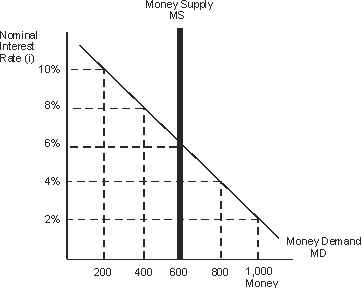
A) increase; 800
B) decrease; 800
C) increase; 1,000 D decrease; 400

A) increase; 800
B) decrease; 800
C) increase; 1,000 D decrease; 400

Unlock Deck
Unlock for access to all 163 flashcards in this deck.
Unlock Deck
k this deck
62
For the past 40 years the Federal Reserve has expressed policy in terms of a target value for:
A) bank reserves.
B) open market operations.
C) the Federal Reserve discount rate.
D) the federal funds rate.
A) bank reserves.
B) open market operations.
C) the Federal Reserve discount rate.
D) the federal funds rate.

Unlock Deck
Unlock for access to all 163 flashcards in this deck.
Unlock Deck
k this deck
63
Refer to the figure below. If the Federal Reserve wants to lower the interest rate to 3%, it must ______ the money supply to _____. 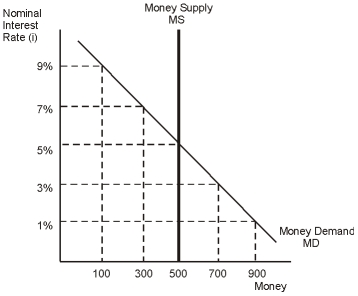
A) increase; 300
B) decrease; 300
C) increase; 900
D) increase; 700

A) increase; 300
B) decrease; 300
C) increase; 900
D) increase; 700

Unlock Deck
Unlock for access to all 163 flashcards in this deck.
Unlock Deck
k this deck
64
Refer to the figure below where the nominal interest rate equals 6% and the money supply equals 600. If the Federal Reserve wants to set the nominal interest rate at 10%, it must conduct open market _____ to set the money supply at _____. 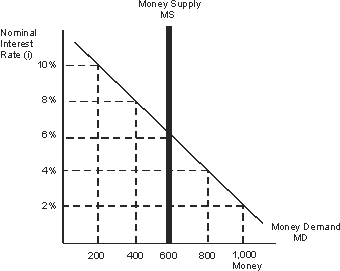
A) purchases; 200
B) sales; 200
C) purchases; 800
D) sales; 800

A) purchases; 200
B) sales; 200
C) purchases; 800
D) sales; 800

Unlock Deck
Unlock for access to all 163 flashcards in this deck.
Unlock Deck
k this deck
65
The federal funds rate is the interest rate on short-term loans made by:
A) the Federal Reserve to commercial banks.
B) the federal government to commercial banks.
C) commercial banks to other commercial banks.
D) the Federal Reserve to the federal government.
A) the Federal Reserve to commercial banks.
B) the federal government to commercial banks.
C) commercial banks to other commercial banks.
D) the Federal Reserve to the federal government.

Unlock Deck
Unlock for access to all 163 flashcards in this deck.
Unlock Deck
k this deck
66
The interest rate that commercial banks charge each other for very short-term loans is called the:
A) prime rate.
B) bank loan rate.
C) federal funds rate.
D) Federal Reserve discount rate.
A) prime rate.
B) bank loan rate.
C) federal funds rate.
D) Federal Reserve discount rate.

Unlock Deck
Unlock for access to all 163 flashcards in this deck.
Unlock Deck
k this deck
67
Refer to the figure below. If the Federal Reserve wants to set the nominal interest rate at 9%, it must conduct open market ______ to set the money supply at _____. 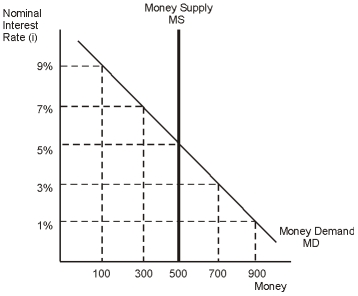
A) purchases; 100
B) sales; 100
C) purchases; 900
D) sales; 900

A) purchases; 100
B) sales; 100
C) purchases; 900
D) sales; 900

Unlock Deck
Unlock for access to all 163 flashcards in this deck.
Unlock Deck
k this deck
68
Refer to the figure below. If the Federal Reserve wants to raise the interest rate to 7%, it must ______ the money supply to _____. 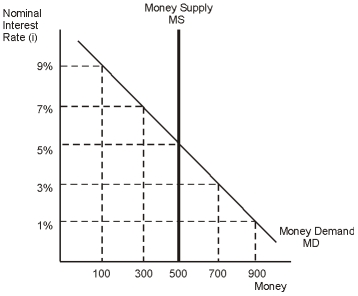
A) increase; 300
B) decrease; 300
C) increase; 900
D) increase; 700

A) increase; 300
B) decrease; 300
C) increase; 900
D) increase; 700

Unlock Deck
Unlock for access to all 163 flashcards in this deck.
Unlock Deck
k this deck
69
Financial markets pay close attention to changes in the federal funds rate because these changes:
A) directly affect a large volume of loans.
B) indicate the Fed's plans for monetary policy.
C) indicate commercial bank lending policies.
D) directly affect the interest payments on the national debt.
A) directly affect a large volume of loans.
B) indicate the Fed's plans for monetary policy.
C) indicate commercial bank lending policies.
D) directly affect the interest payments on the national debt.

Unlock Deck
Unlock for access to all 163 flashcards in this deck.
Unlock Deck
k this deck
70
If the Federal Reserve sets a target nominal interest rate, it can:
A) independently set a target money supply.
B) only set a money supply target that is consistent with the nominal interest rate target.
C) achieve this target with any arbitrary supply of money.
D) shift the money demand curve to the right.
A) independently set a target money supply.
B) only set a money supply target that is consistent with the nominal interest rate target.
C) achieve this target with any arbitrary supply of money.
D) shift the money demand curve to the right.

Unlock Deck
Unlock for access to all 163 flashcards in this deck.
Unlock Deck
k this deck
71
In the long run the real interest rate is determined by ______, and in the short-run the Federal Reserve can control the real interest rate by setting the nominal interest rate if inflation adjusts _____.
A) saving and investment; slowly
B) saving and investment; quickly
C) the Federal Reserve; to equal the increase in the money supply
D) the Federal Reserve; slowly
A) saving and investment; slowly
B) saving and investment; quickly
C) the Federal Reserve; to equal the increase in the money supply
D) the Federal Reserve; slowly

Unlock Deck
Unlock for access to all 163 flashcards in this deck.
Unlock Deck
k this deck
72
If inflation does not adjust rapidly in the short run, then when the Federal Reserve decreases the nominal interest rate, the real interest rate in the short run will ____.
A) increase
B) decrease
C) not change
D) be determined by saving and investment decisions.
A) increase
B) decrease
C) not change
D) be determined by saving and investment decisions.

Unlock Deck
Unlock for access to all 163 flashcards in this deck.
Unlock Deck
k this deck
73
When commercial banks borrow reserves from the Fed, the quantity of reserves in the banking system ______ and, ultimately, the money supply _____.
A) increases; increases
B) increases; decreases
C) decreases; increases
D) decreases; decreases
A) increases; increases
B) increases; decreases
C) decreases; increases
D) decreases; decreases

Unlock Deck
Unlock for access to all 163 flashcards in this deck.
Unlock Deck
k this deck
74
Refer to the figure below where the nominal interest rate equals 6% and the money supply equals 600. If the Federal Reserve wants to set the nominal interest rate at 4%, it must conduct open market _____ to set the money supply at _____. 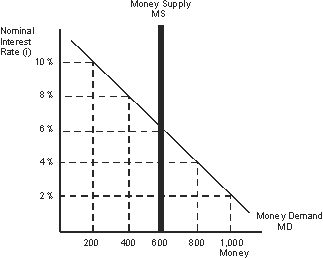
A) purchases; 200
B) sales; 200
C) purchases; 800
D) sales; 800

A) purchases; 200
B) sales; 200
C) purchases; 800
D) sales; 800

Unlock Deck
Unlock for access to all 163 flashcards in this deck.
Unlock Deck
k this deck
75
Refer to the figure below. Based on the diagram, the nominal interest rate equals ______ and the money supply equals ____. 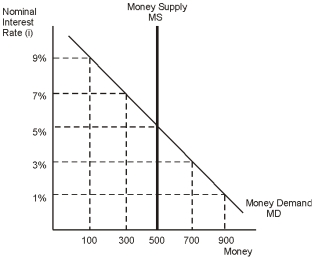
A) 7%; 300
B) 1%; 500
C) 5%; 500
D) 3%; 700

A) 7%; 300
B) 1%; 500
C) 5%; 500
D) 3%; 700

Unlock Deck
Unlock for access to all 163 flashcards in this deck.
Unlock Deck
k this deck
76
Refer to the figure below where the nominal interest rate equals 6% and the money supply equals 600. If the Federal Reserve wants to raise the interest rate to 8%, it must _____ the money supply to _____. 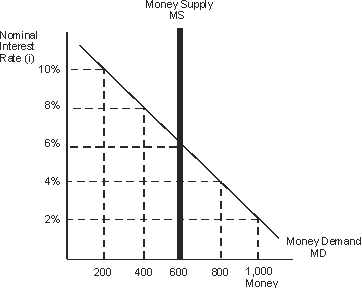
A) increase; 800
B) decrease; 800
C) increase; 400
D) decrease; 400

A) increase; 800
B) decrease; 800
C) increase; 400
D) decrease; 400

Unlock Deck
Unlock for access to all 163 flashcards in this deck.
Unlock Deck
k this deck
77
The interest rate the Federal Reserve charges commercial banks to borrow reserves is called the ______ rate.
A) Fed funds
B) prime
C) discount
D) Federal
A) Fed funds
B) prime
C) discount
D) Federal

Unlock Deck
Unlock for access to all 163 flashcards in this deck.
Unlock Deck
k this deck
78
The Federal Reserve discount rate is the rate of interest charged on loans from ______ to _____.
A) the Federal Reserve; commercial banks
B) the Federal Reserve; the U.S. Treasury
C) commercial banks; the Federal Reserve
D) the U.S. Treasury; commercial banks
A) the Federal Reserve; commercial banks
B) the Federal Reserve; the U.S. Treasury
C) commercial banks; the Federal Reserve
D) the U.S. Treasury; commercial banks

Unlock Deck
Unlock for access to all 163 flashcards in this deck.
Unlock Deck
k this deck
79
The Federal Reserve can:
A) simultaneously set independent money supply and nominal interest rate targets.
B) only target the nominal interest rate, not the money supply.
C) only set a money supply target that is consistent with a nominal interest rate target, and vice versa.
D) only target the money supply, not the nominal interest rate.
A) simultaneously set independent money supply and nominal interest rate targets.
B) only target the nominal interest rate, not the money supply.
C) only set a money supply target that is consistent with a nominal interest rate target, and vice versa.
D) only target the money supply, not the nominal interest rate.

Unlock Deck
Unlock for access to all 163 flashcards in this deck.
Unlock Deck
k this deck
80
When the Federal Reserve lends reserves to commercial banks, this is an example of:
A) a change in reserve requirements.
B) an open-market sale.
C) an open-market purchase.
D) discount window lending.
A) a change in reserve requirements.
B) an open-market sale.
C) an open-market purchase.
D) discount window lending.

Unlock Deck
Unlock for access to all 163 flashcards in this deck.
Unlock Deck
k this deck


